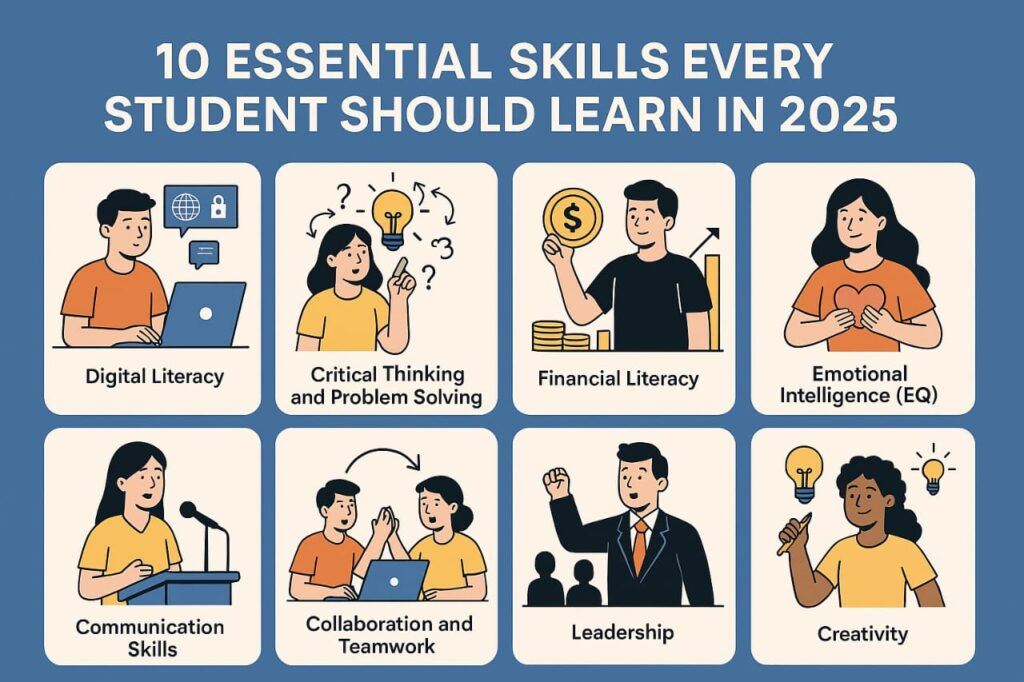Introduction
Today’s world is changing very fast. Artificial Intelligence (AI), gig economy, working from home, climate change and technological advancement – all these together are changing our education, work and life. In such a time, only bookish knowledge is not enough. Students will now have to learn such skills which will be useful to them in future life – such as operating a computer, thinking ability, talking well and understanding your emotions. In this article, we will talk about those 10 important skills which every student must learn in 2025. Whether you are in school, college or a teacher – this information is beneficial for everyone.
1. Digital Knowledge
Digital knowledge does not mean just operating a computer. It means how you use technology in a correct and safe way.
Why it is important in 2025:
Nowadays most of the work is done through computer and internet. Online studies and working together in a team have become common now. There are dangers on the internet, so it is important to keep yourself safe.
What should be learned:
Using tools like Google and Microsoft
Finding the right information from the internet
Creating a good password and avoiding online fraud
Working with a team on apps like Zoom, Slack, Trello
Solving small computer or mobile problems yourself
How to start:
Join free courses like Google Digital Garage, Microsoft Learn or LinkedIn Learning and learn slowly.
2. Critical Thinking and Problem Solving
A lot of information is available in today’s world, but not all of it is correct. Therefore, it is important that students can think, understand and take the right decisions themselves.
Why it is important:
Computers look at data, humans differentiate between right and wrong.
Companies prefer people with positive thinking.
It is important to act thoughtfully in everyday life – from money to social media.
What to learn:
Analyze things carefully (like understanding a news story properly)
Logic – meaning finding the reason for something
Take decisions after looking at evidence
Take steps thoughtfully even when nothing is clear
How to learn:
Participate in activities like debate or Model UN
Discuss real-world problems in school or college
Practice easy methods of thinking like SWOT and Socratic Method
3. Financial Literacy
Money savvy is a must for every student in 2025. Students are so used to loans, credit cards, rising costs and money worries that they are so quick to learn how to manage money wisely right from the start.
What you need to learn:
Budgeting (i.e., how much money you have and where to spend it)
Saving and investing early (e.g., growing your money with compound interest)
What a credit score is and how to get a loan the right way
Tax and retirement planning tips
How to get started:
Use apps to help: Mint, YNAB, PocketGuard
Read easy and popular books: Rich Dad Poor Dad, I Will Teach You to Be Rich
Take a free online course: Khan Academy’s Financial Awareness Course
What’s the benefit:
Students who learn to manage money well are more independent, less in debt and better decision makers throughout their lives. They also have more freedom in choosing a job.
4. Understanding and managing emotions (Emotional Intelligence – EQ)
EQ means – the ability to recognize and manage emotions of oneself and others.
In today’s fast and stressful world, EQ has become very important – sometimes even more important than IQ.
5 important parts of EQ:
Understanding yourself – for example, when you are angry or sad
Controlling yourself – means controlling anger or mood
Motivation – pushing yourself towards your goal
Understanding the feelings of others – for example, being able to understand a friend’s sadness
Building good relationships – working in a team and getting along with everyone
Why it is important:
Reduces stress, depression and fatigue
Helps in leadership, decision making and working together with others
Gives strength in both studies and life
Easy ways to increase EQ:
Sit quietly for 5-10 minutes every day (do mindfulness or meditation)
Write down your thoughts and feelings in a diary (Journaling)
Join friendship or mentoring groups in school-college
Read good stories and books, so that you can understand the point of view of others
5. Communication skills
The bottom line: Speaking clearly, writing well, and listening carefully are essential. Every student should learn these skills.
Why it matters:
If you need to explain a project, convince people of your idea, or negotiate for a job — good communication becomes your biggest strength.
There are four forms of communication you should learn:
Speaking (such as in a presentation or group discussion)
Speaking (such as in emails, essays, or reports)
Speaking without speaking (such as body language or tone of voice)
Speaking online (such as chatting or being polite on social media)
How to improve:
Join a speaking club like Toastmasters
Take online writing courses on Coursera or edX
Record your speech and watch and learn
Bonus tip:
Good communication boosts your confidence and helps build good relationships.
6. Embrace change and be flexible
The key: In a changing world, it is important to be able to change yourself and survive in every situation.
How to understand:
Be ready to learn new things
Not be afraid of change
Recover quickly after trouble
How to practice:
Do something new every day that is not easy
Develop a habit to reduce stress (such as deep breathing or meditation)
When something goes wrong, take it as an opportunity to learn
Recommended reading:
Read the book “Growth Mindset” – it tells us that we should not be afraid of challenges.

7. Work together in a team
The key: Working alone is fine, but working together in a team is more important.
Key points:
Listen to others carefully
Take equal part in all tasks
Resolve conflicts by staying calm
Respect everyone’s opinions
Easy collaboration tools:
Google Docs and Sheets – for working together
Slack – for communicating
Trello or Asana – for managing work
Tips:
After every group project, think about what you did well and what you could have done better.
8. Be creative and bring in new ideas
Key points: Computers can do a lot, but only humans have the power to think and create.
Benefits:
You can do something different by thinking new
Big problems can be solved in a different way
Today every company needs people who can think new
How to increase creativity:
Join a hackathon or a creator club
Create your ideas with a tool like Canva
Take a course related to art, music or writing
Write a new idea in your diary every day
Tip:
When you think of new ideas, don’t test them immediately. First think as much as you can.
9. Proper use of time and discipline
The main thing: Nowadays there are many things that distract your attention – so it is very important to use time in the right way.
Benefits:
Reduces stress
Gets good results in studies and work
Saves time for hobbies and relaxation
How to do it:
Adopt the Pomodoro method – 25 minutes work, 5 minutes break
Make a list of important and unimportant tasks
Plan your day or week in advance
Helpful apps and tools:
Notion or Todoist – to remember tasks
Forest or Focus Keeper – to divert attention from the phone
Toggl – to track your time
10. Understanding of coding and AI
The main thing: Technology is in every field today. If you understand coding and AI (artificial intelligence), many paths to move forward will open up.
What to learn:
Easy programming languages: Python, HTML, CSS, JavaScript
How AI works (e.g. machine learning, data)
How to use AI correctly
Where to learn (absolutely free):
Scratch – for beginners
Code.org or Khan Academy
FreeCodeCamp, Coursera, edX
Bonus:
Even if you don’t go into the technical field, understanding technology is very useful in every job today.

Prepare for the future from today
Now studying does not mean just memorizing books. The real work is that which helps you move ahead in life – like the way of thinking, talking to people, and making friends with technology. If you learn these 10 skills, you will not only be job-ready, but will also be able to face any challenge easily.
| Summary Table | |
|---|---|
| Skill | Why It Matters |
| Digital Literacy | Navigating and leveraging tech safely and effectively |
| Critical Thinking | Making smart, evidence-based decisions |
| Financial Literacy | Managing personal finances and avoiding debt |
| Emotional Intelligence | Handling emotions and building strong relationships |
| Communication | Speaking and writing clearly to influence and connect |
| Adaptability | Thriving in uncertainty and bouncing back from failure |
| Collaboration | Working well in diverse, digital-first teams |
| Creativity | Innovating and solving problems in unique ways |
| Time Management | Boosting productivity and reducing stress |
| Coding & AI | Understanding and contributing to the digital economy |
Call to action
If you are a student, choose any 2 of the 10 skills mentioned above and decide how you will learn them in the next few weeks. You can spend some time every day, watch videos, practice or learn with friends. If you are a teacher or parent, discuss these skills with children. Explain to them in a practical way how these will help them in their future.
Every small step is a beginning to move forward.
Conclusion
Today’s world is changing very fast. Now just reading books or getting good marks is not enough. Students who understand the change, are ready to learn new things and know how to use technology properly – only they will be successful in the future. These 10 skills – such as thinking power, communicating well, managing time, and understanding technology – make every student strong and self-reliant. By adopting these skills, any student can not only do well in his career but can also become a good human being. Remember – start today, keep learning, and move a little forward every day. The future belongs to those who work hard today.
If you liked this article, please share it and let us know your suggestions so we can continue to improve.